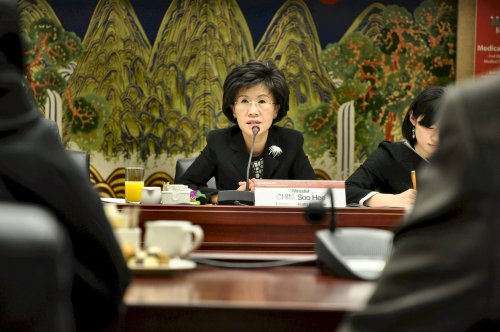Almost two years ago, local authorities decided to promote the nation’s medical industry for international visitors looking for treatment.
During the last 20 years, the private healthcare systems of a number of countries including Korea have developed rapidly with leading medical centers reaching equivalent levels to those in the United States, Canada and Europe.
“We have globally competitive medical professionals and technologies and our industry has developed to the point that patients can come to Korea for medical services,” said Minister of Health and Welfare Chin Soo-hee to a group of ambassadors with the hopes of promoting the nation’s medical sector abroad.
Chin believes that Korea can make huge waves in attracting international patients away from the top destinations, India and Thailand.
India’s medical tourism has increased by 30 percent and could become a $1.2 billion industry by 2012.
In Thailand’s case, the industry has grown to almost a million patients a year.
There are currently 28 countries catering to medical tourists, providing care to more than two million foreign patients annually.
Many governments in developing countries see medical tourism as an excellent way to boost the local economy while improving their own health-care systems.
The costs of surgery in another country can be as much as 50 percent less than in the United States, for example.
The number of foreign patients that opted for treatment in Korea has risen from 60,000 in 2009 to 80,000 last year.
 |
Minister of Health and Welfare Chin Soo-hee discusses medical tourism options with the diplomatic corps. (Yoav Cerralbo/The Korea Herald) |
To expand the local medical tourism sector, Chin’s ministry has signed memoranda of understanding with their counterparts in the United Arab Emirates and Mongolia.
The Health Ministry of Dubai recently announced the opening of an office in Seoul that caters to their citizens seeking treatment in Korea.
Russian Ambassador Konstantin Vnukov explained that Russian citizens from Siberia and the Far Eastern region have started traveling to Korea to seek medical attention instead of the traditional countries such as China and Singapore.
“They are quite satisfied of the high level of standards and medical checks, reasonable prices and friendly attitude,” he said.
Yet one unnamed diplomat said that while the quality of services in Korea are amongst the best in the world, the big challenge remains the language barrier between patients and healthcare providers such as nurses and hospital administration.
On the other hand, the Russian Health Ministry is interested in signing an MOU with Korea to promote medical tourism.
Moreover, Vnukov is shopping for a hospital to accommodate the needs of the over 150 Russian diplomats, personnel and their families working at the embassy.
Korea International Medical Association president and president of Seoul National University Hospital Jung Hee-won said that the best way to increase visits by international patients is to continuously maintain the highest quality in terms of treatment, patient safety and human relations.
“If we keep enhancing these three areas, we can be certain that many more patients from overseas will select Korea to find the solutions for their health problems,” he said.
By Yoav Cerralbo (
yoav@heraldcorp.com)








![[Today’s K-pop] Blackpink’s Jennie, Lisa invited to Coachella as solo acts](http://res.heraldm.com/phpwas/restmb_idxmake.php?idx=644&simg=/content/image/2024/11/21/20241121050099_0.jpg)